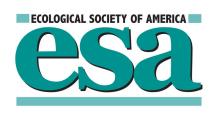Resource information
The opportunity exists to improve intensively managed landscapes (urban and agricultural areas dominated by human activities) through greater engagement of ecologists in the process of ecological landscape design. This approach encourages exploration of multifunctional solutions to meet the needs of growing populations in many areas around the world, while minimizing the negative impacts of human activities on the environment. This is achieved by incorporating theoretical and applied principles from the fields of landscape ecology, agroecology, and ecological design. Multifunctional landscapes can be designed to provide a range of environmental, social, and economic functions, while considering the interests of landowners and users. Here, we propose a process for designing multifunctional landscapes, guided by ecological principles in the following steps: (1) defining the project site and landscape context, (2) analyzing landscape structure and function, (3) master planning using an ecosystem approach, (4) designing sites to highlight ecological functions, and (5) monitoring ecological functions. The development of a framework for ecological design of landscapes demonstrates the importance of a multiâscale approach for connecting sites to their surroundings, the benefits of a multifunctional design for sustainability, and the value of involving ecologists throughout the entire design process. The ecological design approach is explored for the University of Illinois Field Research Station.



